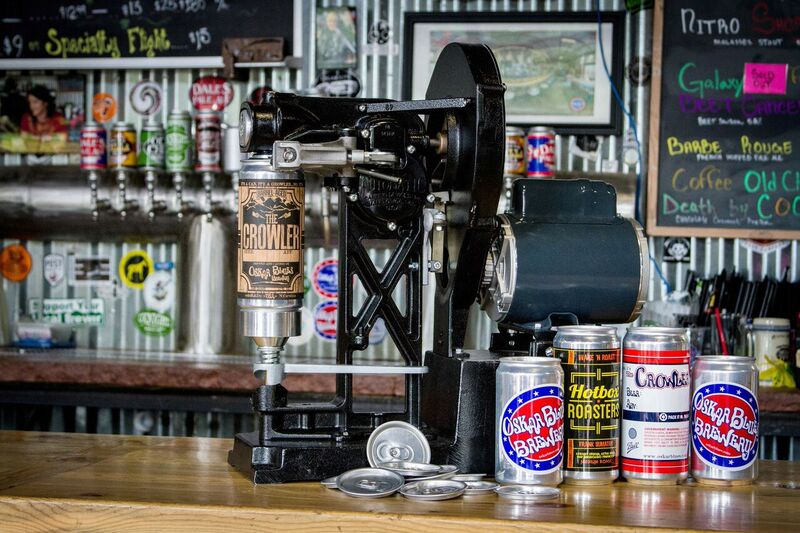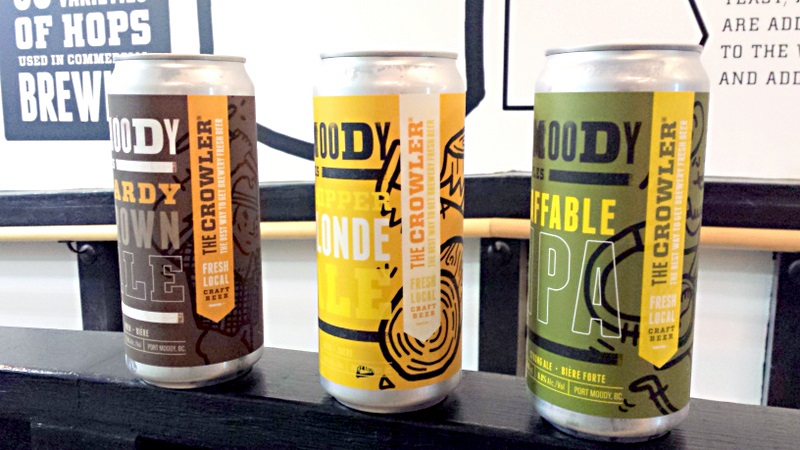Can Appeal: The Crowler Gains Traction

The Crowler resulted from a partnership between Oskar Blues Brewery and Ball Corp. (Photo courtesy Oskar Blues Brewery)
Boothbay Craft Brewery, a small brewpub located in a Maine resort town, has its local patrons, but it also attracts a steady stream of travelers who stop by the brewery for flights and pints. Until recently, if those visitors wanted to take a beer back home, they could buy a 32- or 64-ounce glass growler, which, once empty, would likely end up attracting dust along with a stash of other growlers in the back of a closet.
Hence, the appeal of the Crowler, a one-time-use 32-ounce canned growler. The Crowler, filled on-site like a traditional growler and sealed with a table-top seaming machine, combines the beer can’s freshness factor with the takeaway accessibility of a growler.
The Crowler debuted with Colorado-based Oskar Blues, in partnership with can manufacturer Ball Corp., in January of 2014 and has since steadily started showing up in brewery tap rooms, retail shops and bars across North America.
For breweries, the Crowler has its time- and energy-saving advantages. Tasting-room staff can pre-fill and seal Crowlers, and save time on cleaning and filling glass growlers, says Boothbay brewer and co-owner Win Mitchell.
“We use to do up to 100 growlers a day in summertime,” Mitchell says. “It took too much time, energy, electricity and heat just cleaning glassware.”
The grab ’n’ go nature of the Crowler appeals to customers as well. At Moody Ales in Port Moody, British Columbia, the brewery rarely fills Crowlers on demand, says Moody Ales co-owner Adam Crandall. Rather, they fill a selection of Crowlers at the beginning of the week and have them available for quick pickups. They also keeps beer fresher longer than standard glass growlers, says Crandall. The brewers tested them up to three months out and found that the beer held up.

Crowlers at Moody Ales in British Columbia. (Photo courtesy Moody Ales)
The hybrid nature of a Crowler may also present its greatest disadvantage, as it bumps up against licensing snafus and complications. In British Columbia, for example, brewers have to treat the Crowler as a standard packaged product, so unlike with a traditional growler, they have to register every beer they want to put in a Crowler with the Liquor Control and Licensing Branch.
And in Texas, the Texas Alcoholic Beverage Commission (TABC) requires retailers, like beer bars and growler stations, to have a brewpub license in order to operate a filling machine used for a Crowler.
As TABC representative Chris Porter explained to the website Austin360, after a coffee bar was ordered to remove its Crowler machine: “Only someone who manufactures that product can can that product. Canning is looked at as a manufacturing process, and a growler is looked at a little more leniently under the law.”
Snafus aside, the Crowler shows no sign of slowing down.

I know a few places that would benefit from this
There is far too much government regulation/restriction on the adult beverage industry; from recipes and creation, to taxation, to packaging, to distribution, to consumption.
I like the idea. Freshness and longevity are problems with conventional growlers.